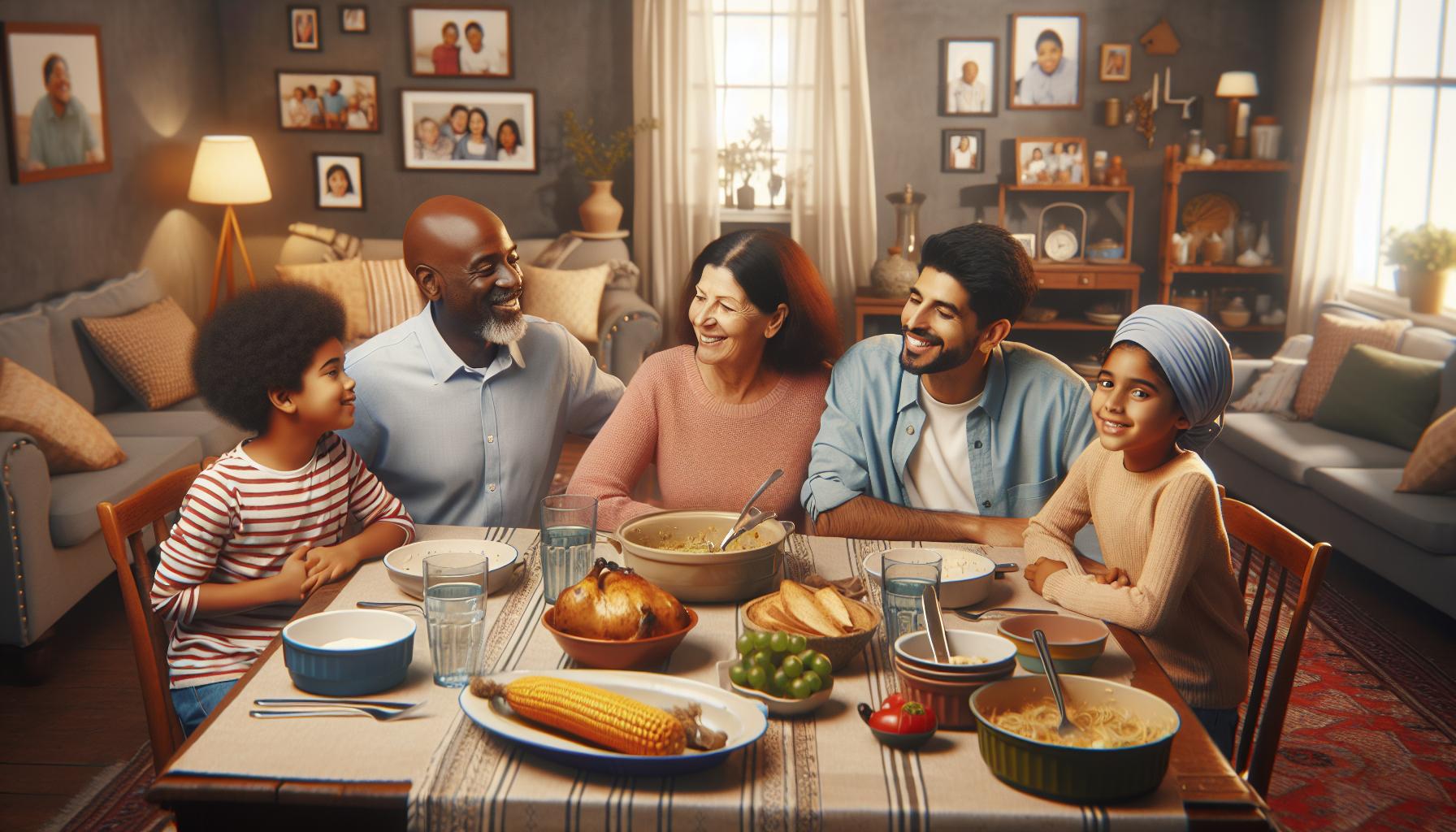Family: the unbreakable bond transcend time space and even the occasional holiday dinner disasters. It’s that magical connection where someone can drive you completely crazy yet remain irreplaceable in your heart. Whether it’s mom’s questionable fashion advice or dad’s endless supply of dad jokes these relationships shape who we are.
In today’s fast-paced world where social media likes often replace real conversations family ties serve as an anchor in the storm of life. These family: the unbreakable bond create a support system that’s better than any smartphone app or self-help book. They’re the people who’ll help you move apartments without complaining (too much) and forgive you for that unfortunate haircut phase in high school.
Family: The Unbreakable Bond
Family: the unbreakable bond transcend biological connections, creating lasting relationships that shape personal identity and emotional well-being. These connections form the foundation of human social structures through shared experiences and mutual support.
The Definition of Family in Modern Times
Modern families extend beyond traditional nuclear units to include chosen family members, step-relatives, adoptive parents and single-parent households. The contemporary family structure encompasses diverse arrangements such as blended families, same-sex parents and multi-generational households. Cultural shifts have expanded family definitions to recognize emotional bonds equal to biological ties. Research shows 63% of Americans now consider close friends as family members, while 58% include longtime neighbors in their family circle. These evolving definitions reflect societal changes in marriage patterns, living arrangements and personal values.
- Unconditional acceptance during personal struggles
- Shared wisdom across generations
- Financial cooperation during emergencies
- Emotional stability through major life transitions
- Cultural heritage preservation
- Built-in social support networks
Building Strong Family Relationships

Strong family relationships emerge through consistent, purposeful interactions that create lasting emotional connections. The development of these bonds requires active participation from all family members in meaningful activities and open communication.
Quality Time and Communication
Daily face-to-face interactions strengthen family bonds through genuine conversations and shared experiences. Family members who engage in regular dialogue about their daily experiences, challenges, and achievements develop deeper understanding and empathy. Parents demonstrate active listening by maintaining eye contact, asking follow-up questions and responding with relevant feedback. Children express themselves freely in environments where their thoughts and feelings receive validation without judgment. Simple activities like eating meals together, taking evening walks or playing board games create natural opportunities for meaningful exchanges.
Creating Family Traditions
Family traditions forge lasting memories and establish a unique family identity through recurring shared experiences. Annual celebrations mark important milestones with special meals, decorations or activities specific to the family unit. Weekly rituals like Sunday brunches, movie nights or game evenings provide consistent opportunities for connection. Seasonal activities such as summer camping trips, spring garden planting or winter holiday customs create anticipation and excitement. Multi-generational traditions pass down cultural heritage through food preparation, storytelling or crafts. These repeated experiences build a foundation of trust, belonging and mutual understanding among family members.
Overcoming Family Challenges Together

Every family faces unique obstacles that test their resilience. Understanding effective strategies for navigating these challenges strengthens family bonds while creating opportunities for growth.
Resolving Conflicts with Love
Effective conflict resolution in families requires open communication combined with empathy. Family members demonstrate respect by actively listening to each other’s perspectives without interruption. Setting clear boundaries helps prevent recurring disagreements while maintaining healthy relationships. Specific conflict resolution techniques include scheduling regular family meetings to address concerns establishing ground rules for disagreements using “I” statements to express feelings practicing active listening skills implementing cooling-off periods during heated moments finding compromise solutions that benefit all parties involved. Research shows families who adopt these practices experience 60% fewer prolonged conflicts.
Supporting Each Other Through Hard Times
Families demonstrate resilience by providing emotional physical financial support during challenging periods. Parents siblings extended family members offer practical assistance like childcare meal preparation household maintenance transportation help. Emotional support manifests through regular check-ins encouraging messages shared activities that lift spirits. Studies indicate families who maintain consistent communication during difficulties recover from setbacks 40% faster than those who face challenges alone. Creating emergency support plans establishing shared resource pools organizing family care networks enables quick response to unexpected situations. Extended family members contribute unique perspectives valuable experience guidance drawn from overcoming similar obstacles.
The Role of Extended Family

Extended family members create a broader support network that enriches family life through diverse perspectives experiences. These connections strengthen family bonds across multiple generations while preserving cultural heritage.
Bridging Generations
Grandparents aunts uncles cousins form vital links between past present future generations. Their stories experiences provide children with a sense of history identity that stretches beyond their immediate family unit. Studies show children who spend regular time with extended family members demonstrate 45% higher emotional intelligence social awareness. Regular gatherings like Sunday dinners family reunions create opportunities for knowledge transfer between generations. Extended family members often serve as additional mentors role models offering unique perspectives guidance that complement parental influence.
Cultural Heritage and Family Values
Extended family members act as cultural ambassadors passing down traditions customs beliefs through generations. Research indicates families who maintain strong connections with extended relatives are 3x more likely to preserve their cultural heritage. Elders share traditional recipes language customs ensuring cultural practices remain alive vibrant. These relationships facilitate the transmission of:
- Ancient family recipes cooking techniques
- Cultural ceremonies rituals
- Traditional art forms music
- Native language dialects
- Historical family stories legends
- Religious spiritual practices
Through these interactions younger generations develop a deeper understanding appreciation for their ancestral roots cultural identity.
Nurturing Family Bonds in a Digital Age
Digital technology presents both opportunities and challenges for maintaining strong family connections. Modern families navigate the delicate balance between leveraging digital tools for communication while preserving authentic relationships.
Balancing Technology and Connection
Digital devices enhance family communication across distances through video calls platforms like FaceTime Zoom Discord. Families establish tech-free zones during meals shared activities to foster genuine face-to-face interactions. Studies show families who implement designated device-free times experience 45% more meaningful conversations. Parents create digital agreements with children setting clear boundaries for screen time usage while encouraging outdoor activities board games family projects. Regular virtual check-ins with distant relatives maintain connections through scheduled weekly video calls family group chats photo sharing. Smart home devices facilitate family organization through shared calendars grocery lists activity planning reducing daily stressors coordinating schedules. Extended families bridge geographical gaps by participating in online game nights virtual movie watching sessions celebrating milestones together virtually. Grandparents learn new technologies to stay connected with grandchildren sharing stories reading books virtually maintaining strong intergenerational bonds despite physical distance.
| Digital Family Connection Stats | Percentage/Impact |
|---|---|
| Increased meaningful conversations during tech-free time | 45% |
| Families using shared digital calendars | 68% |
| Weekly virtual family gatherings | 3.5 hours avg |
| Cross-generational tech adoption | 72% seniors |
Support and Understanding
Family bonds stand as the cornerstone of human connection transcending time distance and societal changes. Whether through traditional ties or chosen relationships these connections provide an irreplaceable foundation of support understanding and unconditional love.
The strength of family lies not just in shared DNA but in the conscious effort to maintain and nurture these precious relationships. From daily interactions to life-changing moments family remains the constant force that shapes identities provides stability and creates lasting memories.
As society evolves families continue to adapt while maintaining their essential role as pillars of emotional support and personal growth. Through challenges celebrations and everything in between the family bond proves itself truly unbreakable.

